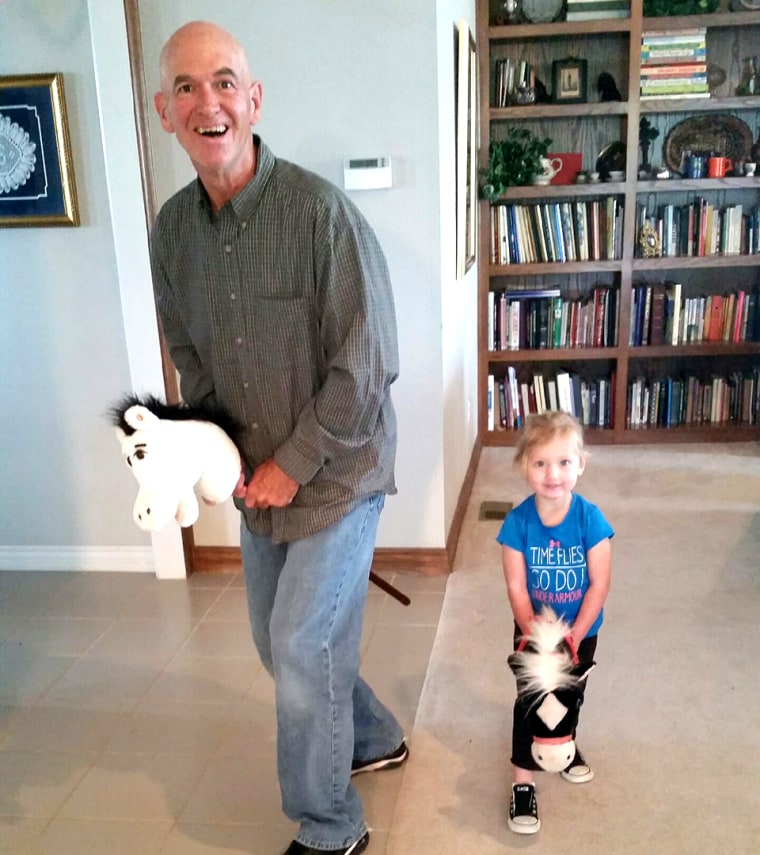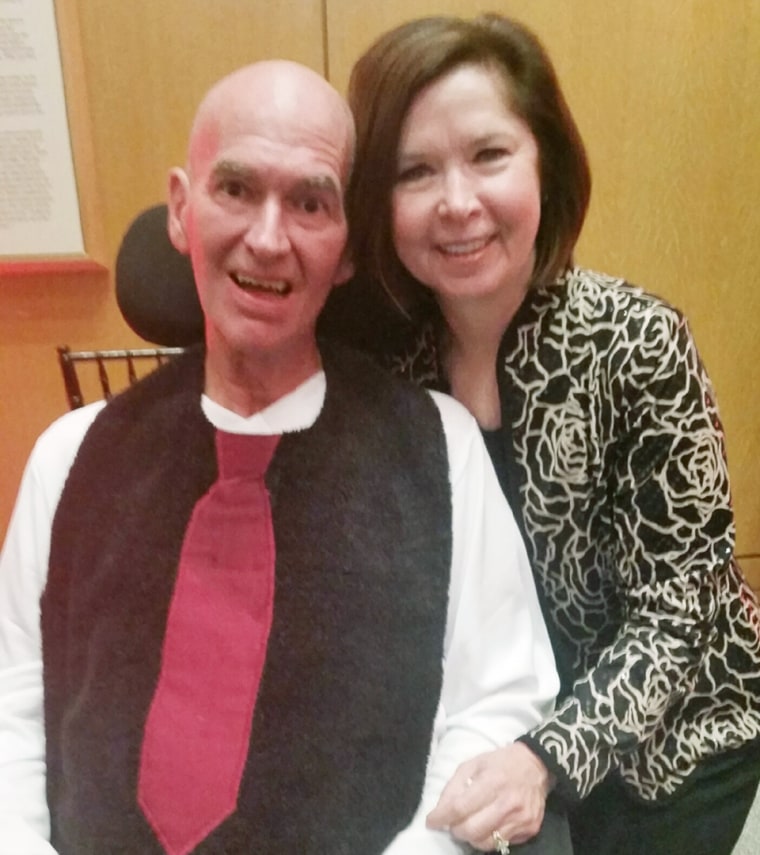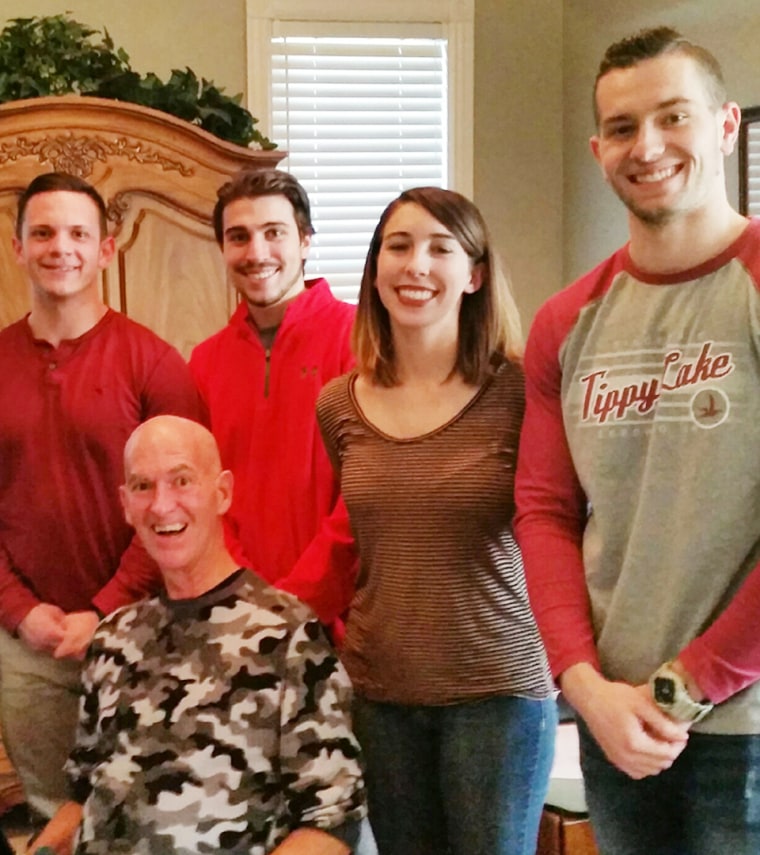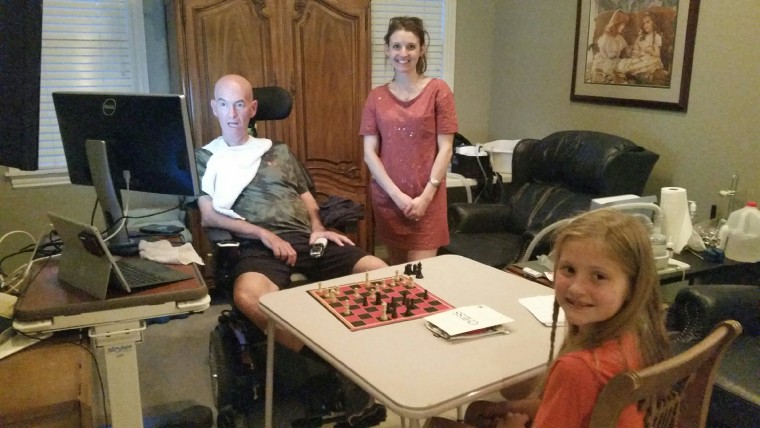In October 2014, Carl Phelps and his daughter Jennifer Driskill were at a football game when Driskill noticed something was wrong. Later, she called her mom, Janice Phelps, and shared her concern.
“Had you noticed that dad is slurring when he speaks?” Driskill asked.
Janice, 64, of Chickasha, Oklahoma, hadn’t noticed anything amiss with her husband. She thought Phelps, 64, was probably talking with a mouth full of sunflower seeds, but she started paying more attention. Soon, she, too, noticed he was struggling to talk.
“It wasn’t the sunflower seeds. He was actually slurring,” she told TODAY.
RELATED: Steve Gleason was a football hero. Now, his legacy is teaching us how to love
Then in November, Phelps attended the funeral of his sister, who passed away because of amyotrophic lateral sclerosis (ALS). As Phelps talked to others, he noticed everyone else seemed to talk with ease while he struggled.

RELATED: Steve Gleason was a football hero. Now, his legacy is teaching us how to love
Even though Janice urged him to see the doctor, Phelps refused. He knew what was wrong: He had ALS and didn’t want to spend his time in doctors’ offices while he still was healthy.
According to the Centers for Disease Control and Prevention, 14,000-15,000 Americans have ALS, a neuromuscular disease. It's more common in men, ages 55 to 75, but the disease can strike at any age. Early symptoms can include muscle twitches in the limbs, shoulder or tongue; muscle cramps and stiff muscles.
In April 2015, Phelps visited his doctor and learned he had bulbar-onset ALS, which affects the tongue, mouth and throat, making it difficult to swallow, speak and breathe. According to the ALS Association, patients with bulbar ALS tend to have a lower life expectancy because of the progressive struggle to breathe.

For as long as he could, Phelps continued serving as a basketball referee and being a doting grandfather, but his ability to swallow and speak deteriorated quickly.
“He really misses speaking,” Janice said. “He is not one to sit and listen. He wants to be involved.”
At first, Phelps, a former high school superintendent, could write, type and sign, but he soon became unable to use his arms and hands. He had no way to ask for help or tell his wife of 40 years that he loved her. The couple visited a clinic and learned he could use eye-gaze communication, an assistive technology that allows people to use their eyes to pick out words and phrases on a screen. However, the staff warned these products cost up to $30,000. It seemed like Phelps was stuck without a way to chat.
In January, they went to a support group meeting for people with ALS, where they learned a group of students from Oklahoma Christian University were building their own eye-gaze communication system at a fraction of the price, a project called VisuALS.
“There really is a market for something that is a lot simpler and a lot more affordable,” Aubrey Gonzalez, a senior electrical and computer engineering major at Oklahoma Christian University, who worked on VisuALS, told TODAY.

RELATED: 'I can do this, I love them': Woman to adopt dying best friend's 4 children
The students — who plan to sell the product for $3,000 — keep the cost down by using off-the-shelf hardware, such as eye trackers and PCs, and by writing their own software.
“Most of these other companies build a proprietary system,” said Tyler Sriver, another electrical and computer engineering major on the project.
They believe it'll be easier to replace broken parts because of the piecemeal way VisuALS is built.
When Phelps learned about this product, he insisted on being involved. Though he had limited forms of communication at the time, he was able to get his point across to his wife.
“He didn’t want to leave the meeting without it,” said Janice. “He said ‘Promise me I can get that.’”
RELATED: Against all odds, dad with ALS walks daughter down the aisle
Janice talked with the students, who needed someone to beta test VisuALS. Two weeks later, they installed it for Phelps. Janice said he takes his job as a tester very seriously, asking them to add some common phrases to make communication even easier. Some suggestions he made include: “These are happy tears;” “I feel great;” “I am afraid;” and “Please, put a cover on me.”
“He asked for a pause button because he said, ‘Sometimes I need to think,’” said Janice.
Working with Phelps has helped the students improve the program to help others with ALS. But it also changed how they view their roles.
“This product shows how diverse engineering can be and that you can have an influence in people’s lives,” said Josh Bilello, an electrical and computer engineering major. “I can go to work every day and feel I can make an impact.”

The impact on Phelps’ life seems immeasurable. He can ask for help again and resumed activities he enjoys, such as playing chess with his granddaughter.
“Carl said one thing that he feels is really important is that he gets to tell me that he loves me,” Janice said. “I can’t begin to tell you how important it is to communicate with him. I would hate to think he needed something and he had no way to tell me.”